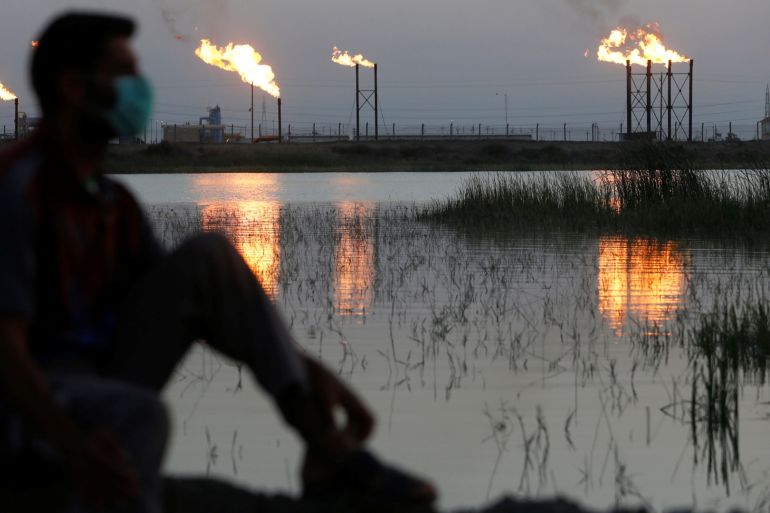Iraq, oil and the future of its youth
The plummeting oil price has devastated Iraq’s economy, as coronavirus lockdown puts youth protests on hold.

On Wednesday, Iraq’s Parliament voted for a new prime minister, Mustafa al-Kadhimi, who now has a month to form a new government.
He faces many challenges beyond just forming a government; the key ones being the budget and dealing with an unemployed youthful protest movement that brought the previous government to its knees, ousted former Prime Minister Adel Abdul Mahdi, and now waits to see what the new government will look like.
Keep reading
list of 4 itemsWhat’s slowing down America’s clean energy transition? It’s not the cost
Global coal use to reach record high in 2023, energy agency says
COP28 Dubai is over: Four key highlights from the UN climate summit
In 2018, I was invited along with a few other journalists to a background briefing in the Iraqi capital, Baghdad, with a senior adviser to then-Prime Minister Haider al-Abadi.
None of us were expecting much from it and we were not disappointed. However, I did take away one piece of information that confirmed what I had suspected for a long time, that the Iraqi economy was in severe flux. It was not news but the severity of it was clearly at the forefront of the adviser’s mind.
He told us that when the weekend came, and oil stopped trading, it gave the government a break and the ability to breathe, because what they were making from oil was far less than what they needed to keep the country running. The weekend meant they did not need to pay any money out, while hoping that the demand for oil would rise and, with it, the price.
Oil at the time was hovering at around the $55 a barrel mark. Iraq needed oil to be at $85 a barrel to meet expenses.
Fast forward to 2020 and Iraq had seemingly learned its lesson and fixed its budget at $55 a barrel. Oil makes up nearly 90 percent of Iraq’s total revenue.
By April, oil at one point was trading at less than 1 cent a barrel. As of the time of writing, it is hovering around the $25 to $30-a-barrel mark.
The upshot? Iraq is broke. Once more. War, bad fiscal management, corruption and political cronyism are to blame, according to popular belief, and that is what fuelled the mass protest movement that began in October.
Due to the coronavirus pandemic, the protest movement in Iraq is currently preserved in figurative aspic, and what used to be large daily gatherings are on hold.
But for how long? Every country is looking to ease restrictions and once Iraq does the protest movement will come alive like never before, according to some protesters. They want political reform, economic reform, and an end to corruption and political cronyism. All things that require long-term change and are impossible to accomplish short term.
Those lucky enough to have jobs in the public sector, which is the largest employer, are bracing themselves for pay cuts which may go as deep as 35 percent. A cut that could make them take to the streets as well.
But the employed make up only a tiny minority. More than 60 percent of Iraqis are under 25, and according to some estimates, nearly half are unemployed in a country that is the second-largest producer of oil in OPEC.
Ahmed Kadhum is a protester from Baghdad. He is typical of the demographic that took to the streets when the protests began in October. Young and unemployed. He remains frustrated.
“We feel the government neglected our demands on purpose and we are waiting for the restrictions of coronavirus to end,” he said. “We will return back and we don’t care for the new PM. It is just a name change from Adel Abdul Mahdi to another. We are preparing and we will be back, bigger than ever.”
Others, though, are tired and wonder if they can continue.
Ali Al Temmemi is a protester from Nasiriya in southern Iraq, where some of the largest demonstrations took place.
“I don’t believe the protest will be as strong as last October for many reasons. Firstly, it took a very long time for us to get out on the streets and the protesters became tired and lost their enthusiasm. The movement made some mistakes and lost respect and support from other people because a minority blocked roads and burned government institutes,” he said.
“For the future, I think we should concentrate on political change.”
For Iraqi politicians, the protest movement is a powder keg waiting to explode.
The coronavirus pandemic should have provided Iraq with breathing space to bank some revenue and put long-term economic reforms in place. Instead, the oil price crash has left it with even less money than in previous years, while its problem of mass youth unemployment remains.
The summer is coming. And with it, unbearable temperatures and the frustrations of the youth may well once again ignite.